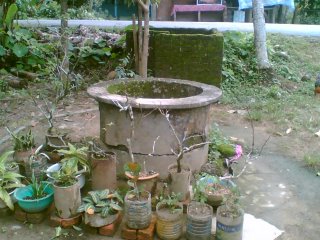Hello! I am from Binjal.
Hah! I said this as if Binjal is so famous like Mawi’s Taib Andak. Well, like it or not, this is the name of my kampung, my place of origin. Located 10 kilometres from Pasir Mas (literally translated as Golden Sand), this kampung is so small it provides sanctuary to only around 30 families. There are three main streets friendly known as ‘alik darat’, ‘alik kelar’ and ‘alik hilir’ (putting these names on the paper for the first time makes them sound so primitive) . My house strategically located in the middle of these roads. So, my father is kinda a public figure, a respected Ustaz Mezoh who knows every single living soul in Binjal.
Binjal definitely keeps thousands of my bittersweet childhood memories. This is the very place where all my physical, spiritual and emotional energy were fully invested for the first fifteen years of my life, the place where I learned my first native language, my mother tongue. (So students, who said that I was brought up in London? All right, I know Lundang is not that far from my kampung, so you got a point there.)
 Well-abandoned well, just next to my house Well-abandoned well, just next to my house
There are few things that I like about this kampung. First, most people can’t live without budu. So, it tells us that they have all those budu-related traits – friendliness, familiness and togetherness. Second, these people are masjid-bounded. Located in the heart of kampung, many night activities are still masjid-regulated. Third, one hardly finds any places of entertainments here, not even a single restaurant. I bet those who have never been out of here for a long time wouldn’t even know what a cyber cafe is. However, despite its thirldwolrdness, this remoteness would undeniably ensure the preservation of those courtesy value systems the government is trying very hard to portray in not-so-artistic ads on TV.
Well, back to my kampung, there is one thing here that I am not comfortable with. The people’s stereotypical lives have silently established many unwritten rules and policies that in turn expect all the new generations to follow and obey. Of course, there are no Gestapo-like officers to monitor this, but the expectation is overwhelming. Having left my kampung fifteen years ago, I have developed a new rebellious sense of getting things that most people in my kampung wouldn’t approve. Perhaps, I have been imagining all these. But this strong attitude of mine has brought me to certain detrimental level of contempt and aloofness.
It is a pity that after thirty years, I hardly remember people’s names in my kampung. Two days ago, an old man paid a raya visit to my house. I was alone in the living room.
"Assalamualaikum!" "Waalaikumussalam, masuklah pakcik." We shook hands and I went to the kitchen to inform my sister. "Who came?" my sister asked. Not knowing the name of the man, I answered bluntly, "Kawan ayah kot." Immediately, my sister went to see him. "O... Pak Do.." Huh? Pak Do? Pak Do? Pak Do? Hah! (Gasping) Ya Allah, he is my father's uncle! How could I not remember him? Damn Cekmi.
You see, this ignorance was embarrassing. There were many times when I keep refusing my sister’s request to send some kuehs to somebody’s house, not because I was so lazy to do it, but I had no idea who that somebody was, and I was so damn malu to admit that I didn’t know who that fella was. So pathetic. I know.
Despite all these mixed feelings I harbour inside, I love this kampung. This remote one-of-a-kind kampung holds so many precious things I couldn’t even possibly find in any other places in the world, not even in Hollywood or Bollywood. Its serenity, sireh pulang ke gagang sentiments would always remind me who I am, or who I was before. This is my root. And for this reason, wherever I go, I would remember this particular reality.
That I am still from Binjal, not London.
Labels: cekmi's budu roots |

